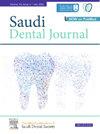Favorable Strategies for oral biology learning from dental students’ perception
IF 2.3
Q3 DENTISTRY, ORAL SURGERY & MEDICINE
引用次数: 0
Abstract
Oral biology is an important tool in clinical dental training. Therefore, a good understanding of oral biology is crucial for improving the outcomes of dental education. This study aims to assess dental students’ perceptions of the relevance of oral biology in dentistry and investigate their attitudes toward learning and study approaches. We also investigated the acceptance of each teaching method and study resources.
Materials and methods
A Likert scale-based online questionnaire was administered to undergraduate dental students, dental interns and to a group of postgraduate dental students at the College of Dentistry, Umm AlQura university in the end of the academic year.
Results and conclusion:
The results indicated that most dental students consider oral biology relevant to dental education and clinical practice. Academic lectures appear to be the most favorable learning method for dental students, followed by practical sessions. Regarding preferred study resources, handouts appeared to be the most preferred, followed by online resources. Furthermore, it appears that students’ preferences for teaching methods and study resources often vary according to their academic level; overall, it appears that students depend more on passive learning than active learning.
从牙科学生的感知中学习口腔生物学的有利策略
口腔生物学是临床口腔培训的重要工具。因此,了解口腔生物学对提高牙科教育的效果至关重要。本研究旨在评估牙科学生对口腔生物学与牙科相关的认知,并调查他们对学习和学习方法的态度。我们还调查了各种教学方法和学习资源的接受程度。材料与方法采用李克特量表对乌姆阿尔库拉大学牙科学院的牙科本科生、牙科实习生和一组牙科研究生进行在线问卷调查。结果与结论:大多数学生认为口腔生物学与口腔教育和临床实践相关。对牙科学生来说,学术讲座似乎是最有利的学习方法,其次是实践课程。在首选的学习资源方面,讲义似乎是最受欢迎的,其次是在线资源。此外,学生对教学方法和学习资源的偏好往往因其学术水平而异;总的来说,学生似乎更依赖于被动学习而不是主动学习。
本文章由计算机程序翻译,如有差异,请以英文原文为准。
求助全文
约1分钟内获得全文
求助全文
来源期刊

Saudi Dental Journal
DENTISTRY, ORAL SURGERY & MEDICINE-
CiteScore
3.60
自引率
0.00%
发文量
86
审稿时长
22 weeks
期刊介绍:
Saudi Dental Journal is an English language, peer-reviewed scholarly publication in the area of dentistry. Saudi Dental Journal publishes original research and reviews on, but not limited to: • dental disease • clinical trials • dental equipment • new and experimental techniques • epidemiology and oral health • restorative dentistry • periodontology • endodontology • prosthodontics • paediatric dentistry • orthodontics and dental education Saudi Dental Journal is the official publication of the Saudi Dental Society and is published by King Saud University in collaboration with Elsevier and is edited by an international group of eminent researchers.
 求助内容:
求助内容: 应助结果提醒方式:
应助结果提醒方式:


